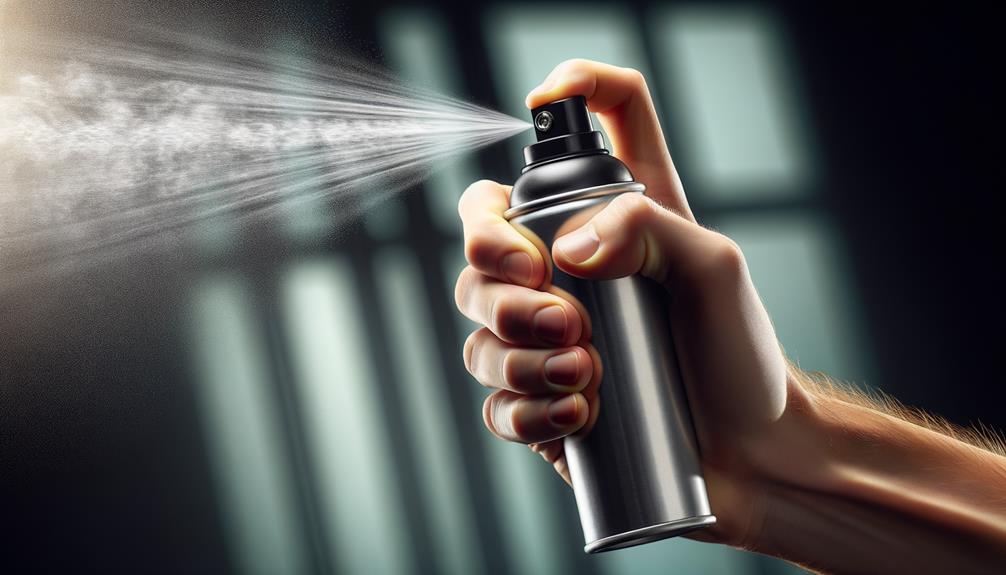
Brainstorm Security Shop

For Orders Over $199

On Any Of Our Products

Details On Refund Page
When facing a potential threat, understanding the proper technique for deploying mace spray can be a crucial aspect of your self-defense strategy. Ensuring you are prepared and confident in your ability to use this tool effectively can make all the difference in a high-stress situation. By mastering the fundamentals of mace spray usage, you can empower yourself to respond decisively and protect yourself in moments of danger.
Using mace spray provides individuals with a non-lethal means of self-defense in dangerous situations. Mace spray is highly effective in incapacitating an attacker temporarily, giving you valuable time to escape and seek help. Its intense burning sensation, along with temporary blindness and difficulty breathing, can deter assailants effectively. When considering alternatives, mace spray stands out as a practical option due to its ease of use and portability.
In terms of legality and restrictions, it’s crucial to be aware of the laws governing mace spray in your area. While mace spray is legal for civilian use in most places, there are restrictions regarding its size, concentration of active ingredients, and where it can be carried. It’s essential to familiarize yourself with these regulations to ensure you’re using mace spray responsibly and within the bounds of the law.

To comprehend the effectiveness of mace spray, it’s essential to understand its key components and how they contribute to its incapacitating effects.
Mace spray, also known as pepper spray, typically contains oleoresin capsicum (OC) as its main ingredient. OC is a derivative of hot cayenne peppers, which is what gives mace spray its powerful irritant properties. When sprayed on an individual, the OC causes immediate inflammation of the mucous membranes in the eyes, nose, and throat, leading to intense burning sensations and temporary blindness. This effect is crucial in disabling an attacker and creating an opportunity for escape.
Apart from OC, mace spray formulations may also include a propellant to disperse the OC effectively over a distance. The propellant is usually a safe, non-flammable substance like nitrogen or carbon dioxide. Understanding the composition of mace spray ingredients is vital in comprehending its spray effectiveness and how it can provide personal protection in threatening situations.
Selecting the appropriate mace spray for your personal safety requires careful consideration of various factors, including potency, size, and ease of use.
When choosing a mace spray, the effectiveness of the spray is crucial. Look for a formula that contains a high concentration of active ingredients like oleoresin capsicum (OC) for maximum effectiveness in disabling an attacker. Opt for a spray with a potency level that ensures quick incapacitation without causing long-term harm.
Consider the size of the mace spray canister. It should be compact enough to carry easily yet have enough volume to provide multiple uses in case of emergencies. Additionally, choose a design that allows for quick and easy deployment to ensure you can access it swiftly when needed.
While mace spray is a popular choice for personal defense, consider alternatives such as pepper gel or foam for indoor use, as they’re less likely to disperse and affect unintended targets.
Evaluate your specific needs and environment to select the most suitable option for your personal safety.
Hold your mace spray canister firmly with a secure grip to ensure proper aim and effective deployment in self-defense situations. Grip strength plays a crucial role in handling the canister securely during high-stress moments. When gripping the canister, make sure your fingers are wrapped around it, providing a stable foundation for aiming accurately.
To enhance aim accuracy, position the canister in front of you with the nozzle facing the target. Keep your arm extended but slightly bent to maintain control and precision. Align the nozzle with your line of sight towards the target to ensure the spray reaches its intended destination.
Practice your grip and aim in a controlled environment to build muscle memory for quick and effective deployment when faced with a threat.
Ensure proper technique when spraying mace by maintaining a firm grip on the canister and aligning the nozzle with your target for effective deployment in self-defense scenarios.
When using mace spray, spraying distance and the proper angle are crucial. Aim for a distance of around 6-8 feet between you and the target. This range allows you to create a barrier between yourself and the threat while ensuring that the mace reaches the intended target effectively. Additionally, make sure to angle the canister slightly downwards towards the target to prevent any blowback.
Target accuracy is essential for the mace spray to be effective. Direct the spray towards the attacker’s face, specifically aiming for the eyes and nose, as these areas are the most sensitive.
Quick reaction time is key in self-defense situations. Be prepared to act swiftly and decisively, as hesitation can give the attacker an advantage.
Practicing these techniques beforehand can help you respond effectively when faced with a threatening situation.

To effectively handle wind and obstacles while using mace spray, adjust your spraying technique to account for environmental conditions and potential barriers. Wind challenges can significantly impact the effectiveness of your mace spray. When faced with windy conditions, be mindful of the wind direction to prevent the spray from blowing back towards you. To counter this, position yourself upwind from the target, ensuring that the wind carries the spray towards the intended recipient. Additionally, hold the canister slightly downward to minimize the chances of the spray drifting back.
When encountering obstacles such as barriers or physical obstructions while trying to use mace spray, strategic tactics are crucial. If there are obstacles between you and the threat, try to find an alternative angle or approach to ensure a clear path for the spray. In situations where direct spraying isn’t feasible, consider bouncing the spray off a nearby surface or object to reach the target effectively.
Following the application of mace spray, it’s essential to take prompt actions to address the aftermath effectively.
After deploying mace spray, ensure the individual receives medical attention if needed. If there are any signs of distress, such as difficulty breathing or severe irritation, don’t hesitate to seek immediate medical help.
Once the immediate medical concerns are addressed, proceed with cleaning the affected area. Use mild soap and water to wash off any residual spray on the skin and clothing. Avoid rubbing the area to prevent further irritation; instead, gently pat dry.
Consider the legal implications of using mace spray. Make sure to familiarize yourself with local laws regarding self-defense products.
It’s also crucial to reach out to support resources if you feel distressed or need guidance on dealing with the aftermath of using mace spray. Organizations like victim support groups or legal aid services can provide assistance and advice in such situations.
When handling mace spray, prioritize safety by observing essential precautions to prevent accidental harm or misuse. Proper storage is crucial to ensure mace spray remains effective and safe. Store the canister in a cool, dry place away from direct sunlight and sources of heat, as high temperatures can cause the canister to leak or explode.
Keep the mace spray out of reach of children and pets to avoid any accidental discharge or ingestion.
When disposing of mace spray, follow specific guidelines to prevent environmental harm. Check with your local waste management facility for disposal instructions, as mace spray is considered hazardous waste. Don’t puncture or incinerate the canister, as this can release harmful chemicals into the air and soil.
Instead, look for designated drop-off locations or hazardous waste collection days in your community. By following proper storage precautions and disposal methods, you can ensure the safe and responsible use of mace spray.

How can you effectively incorporate practice drills to enhance your proficiency in using mace spray for self-defense situations?
Simulation exercises and group training are essential components to sharpen your skills in handling mace spray. By participating in realistic scenarios that mimic potential threatening situations, you can better prepare yourself for actual encounters.
Group training sessions offer the opportunity to observe and learn from others, gaining insights into different tactics and strategies.
Target practice and accuracy drills are crucial for improving your aim and precision when using mace spray. Setting up targets at varying distances and practicing hitting them under different conditions can significantly enhance your ability to effectively deploy mace spray in stressful situations.
Regularly engaging in these drills can help build muscle memory, ensuring that you can react quickly and accurately when faced with a threat.
In conclusion, mastering the use of mace spray for self-defense requires understanding its components, selecting the right product, and practicing proper techniques.
By following these guidelines and staying prepared for various scenarios, you can effectively deter potential threats and protect yourself in dangerous situations.
Remember to prioritize safety measures and regularly practice deploying mace spray to enhance your proficiency and readiness in confronting potential threats.
Stay informed, stay prepared, and stay safe.

Brainstorm Security Shop
1867 Caravan Trail
Ste 105
Jacksonville, FL 32216
Call us toll free: (800) 859-5566